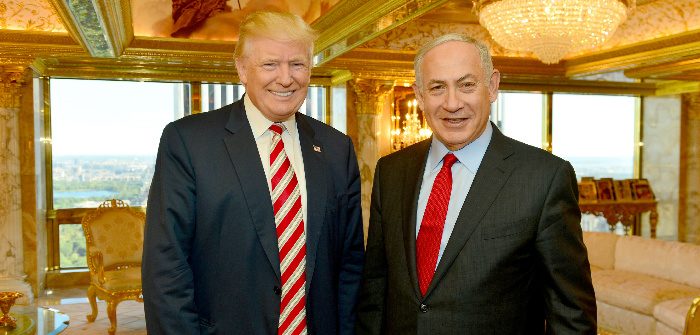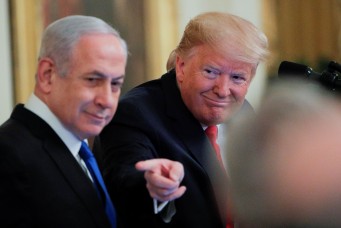Trump’s Threat to Arab-Israeli Peace
U.S. policy threatens to undo not only the two-state solution, but stable relations with Israel’s Arab neighbors.

Israeli Prime Minister Benjamin Netanyahu and then-U.S. presidential candidate Donald Trump, New York, Sept. 25, 2016. Kobi Gideon/Government Press Office/via Reuters
Israel’s religious right is ecstatic about Donald Trump, who is about to hold his first meeting as president with Israeli Prime Minister Benjamin Netanyahu. But its expectation of winning big in the West Bank may have blinded it to the huge potential cost in the region. Indeed, its victory may bring the Arab-Israeli regional peace and security architecture tumbling down on everybody’s heads.
Many on the Israeli right see a historic dream coming true as the United States, their country’s all-powerful ally, elected President Trump, whose policy platform pointedly omits any mention of the two-state solution and whose brain trust includes several individuals—including Vice President Mike Pence and White House chief strategist Steve Bannon—who are hostile to the two-state solution.
Initial contacts between Israel’s national religious leaders and Trump’s advisors suggest to them that Israel no longer needs to seriously support the two-state solution in order to maintain a strong relationship with the United States. Leaders of the national religious Jewish Home party, such as Naftali Bennett and Uri Ariel, and powerful Likud politicians including Minister Israel Katz and Knesset Speaker Yuli Edelstein, therefore advocate more boldly then ever policies that will ultimately lead to discarding the two-state solution and annexing the settlements in the West Bank.
In practice, this means: redefining Israel’s interpretation of international law according to the Levy Report, which rejects the notion that the West Bank is occupied and establishes instead Israel’s legal right to settle it; advancing settlement construction in a critical area called E-1, making contiguous Palestinian statehood virtually impossible; annexing the settlement of Ma’ale Adumim, with or without E-1 near it; annexing Gush Etzion; and annexing the Jordan Valley.
After Prime Minister Benjamin Netanyahu informed the United States and others of his intent to permit passing of the law, the Knesset on February 6 passed the so-called “legalization bill,” which goes well beyond Israel’s long-standing practice of expropriating what it defines as state lands in the West Bank. The law retroactively legalizes the building of settlement houses on private Palestinian property in the West Bank.
Additionally, Trump’s campaign promise of transferring the American embassy from Tel Aviv to Jerusalem, if implemented, will implicitly give U.S. recognition to the Israeli annexation of East Jerusalem. Such international cover will give more ambitious annexationist plans tailwind. Israeli Education Minister Naftali Bennett, for instance, talks of annexing 60 percent of the West Bank while postponing the issue of citizenship for West Bankers. Agriculture Minister Uri Ariel advocates annexing the entire West Bank and naturalizing all its Arab residents within a decade or two.
Discarding the two-state solution in fact dangerously removes a principal pillar of Israel’s security. The risk is not just in frustrating the national aspirations of the 4.5 million Palestinians living in the West Bank and Gaza. It is because removing the prospect of a Palestinian state being established alongside Israel challenges the region’s current Arab-Israeli peace and security architecture, built meticulously with U.S. guidance and support since the 1978 framework agreements of the Camp David Accords.
The Israeli-Egyptian and Israeli-Jordanian treaties were built based on the premise of eventually granting national rights to the Palestinians. In both cases, Jordan and Egypt made clear upon signature that the Palestinian component of the peace agreement is a necessary price for its realization and implementation. Successive Israeli governments have explicitly expressed willingness to grant, under some conditions and at least in some form, Palestinian statehood.
This regional security architecture proved more robust than many expected. Above all, Israeli-Egyptian peace survived the 2012-2013 period of the Muslim Brotherhood’s rule and the Israeli-Jordanian peace treaty overcame unprecedented tensions at Jerusalem’s Holy Esplanade (the Temple Mount/Haram Al-Sharif).
If Israel and the United States act on policies that create the impression in Egyptian and Jordanian public opinion that a Palestinian state can no longer become a reality, Amman and Cairo could find themselves pressed to conduct a major strategic rethink. Popular solidarity with Palestinians could put further political pressure on unpopular governments and trigger majority votes in both parliaments in favor of withdrawing their embassies, putting diplomatic, security, and commercial relations between Israel and the two Arab countries at risk.
Because of Israeli domestic political constraints, annexation, if it continues, will take place in a piecemeal fashion. A clear majority of Israelis notionally supports full annexation of the West Bank, but opposes it concretely when faced with its likely costs, in particular that it would most likely lead to granting citizenship to all Palestinian residents of the West Bank.
A drawn-out annexation process would mean a series of blows to the regional architecture over an extended period, each of itself having low probability of precipitating a collapse. Yet their cumulative impact could be severe, even catastrophic, especially since they would be paired with other damaging factors: the vast majority of Arabs in the Middle East view the new U.S. administration as rabidly anti-Islamic and the Israeli government as taking colonial occupation practices to unsurpassed levels.
To be sure, it is possible that annexationist moves will take place without toppling the regional architecture. Palestinians are in a deep state of fatigue, the Palestinian Authority is weak and isolated, Egypt is focused on its economic survival, Jordan is concentrating on preventing Syria from collapsing southwards, and the Gulf states are involved in no fewer than four regional wars (Iraq, Syria, Yemen and Libya).
But responsible decision makers cannot ignore the risk. The annexation of, say, Ma’ale Adumim and Ariel may come at the enormous cost of unraveling what until today has enabled United States’ Middle Eastern allies to cooperate against the common enemies Iran and the Islamic State. President Trump and Prime Minister Netanyahu should carefully consider the consequences of such a path.
Ofer Zalzberg is the International Crisis Group’s Senior Analyst for Israel/Palestine. He is based in Jerusalem. On Twitter: @OferZalzberg.




